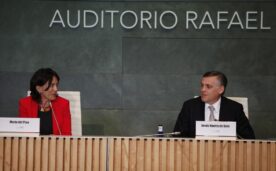On 19 April 2012, the Rafael del Pino Foundation hosted the Master Conference "Financial crisis, banking reform and the future of capitalism", given by Jesús Huerta de Soto, Professor of Political Economy at the Universidad Rey Juan Carlos.
Jesús Huerta de Soto argued that "All the ills that afflict us are the result of the erroneous institutional design of the financial and banking system worldwide and that this has its origins in a mistake made 170 years ago in Robert Peel's England. At that time, a cash ratio of 100% was required for the issuance of paper money, but the same was not required for demand deposits. The result of this is that banks have continued to expand credit without a real savings base and this produces strains in the economy that inevitably lead to financial crises and economic recessions. Therefore, a final and radical reform would be to complete Peel's law where it was incomplete, by also requiring the 100% cash ratio for demand deposits and equivalents. You may think this is a very radical reform but two British MPs have just introduced it in the British Parliament and I was honoured to be cited as the inspiration for it. An independent committee in the UK has decided to go along these lines and they are proposing something that is a timid step forward: to reinstate the Glass-Steagal Act, i.e. to separate commercial banking from investment banking. I believe that if we were to move along these lines, we would take a giant step towards resolving the problems that afflict us today".
As for the role of the European Central Bank and the euro, Professor Huerta de Soto's opinion was categorical: "The ECB, unlike the Bank of England and above all the Federal Reserve, has no responsibility or powers to monetise debt, and this seems to me to be a very important point. What is happening is that in the current crisis, it is giving a little bit of both, sporadically and when the financial markets are more volatile, support, but always in exchange for reforms. This is a kind of poker game in which the ECB says: I'll help you, but reform. And if they see that a country is resting on its laurels, they stop buying that country's sovereign debt and immediately the country is hit with a serious financial crisis. It should be borne in mind that no politician takes any action that is unpopular unless he or she is literally forced to do so, and in this respect the discipline of the euro in general and the ECB in particular is fortunately saving Europe. Those who criticise the euro criticise it precisely because of its main virtue: that it is disciplining, as I said before, politicians and, in general, all the agents that participate in the social process. In order to function, democracy needs a framework that disciplines the agents that participate in it and, in this case, the euro is fulfilling that function. This means that the philosophy of vote-buying, political clientelism, the subsidy economy, the economy based on credit expansion, always saying yes to trade unions... In an environment with a single currency this is immediately paid for in terms of lost competitiveness vis-à-vis our partners and measures must be taken immediately. Thanks to the euro this is becoming evident, so we are in a complete paradigm shift. Our "chip" as workers, employers and politicians I think is changing and in the right direction.







